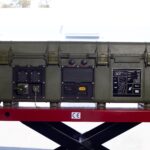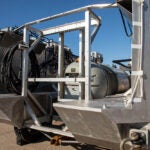United States Strategic Command (STRATCOM) has entered into an agreement with the Belgium Federal Science Policy Office (BELSPO) to share space situational awareness (SSA) services and information, the Defense Department said Feb. 7.The arrangement looks to enhance awareness within the space domain and increase the safety of spaceflight operations. It was signed by USSTRATCOM Director of Plans and Policy Air Force Maj. Gen. Clinton E. Crosier, on Feb. 7 at USSTRATCOM headquarters after Elke Sleurs, Belgium’s secretary of state for…
Recommended

Battlefield Power Solutions Developer Chariot Defense Raises $34 Million
Trending
Congress Updates
Wicker Wants Legislation On DoD’s Equity Investments In Minerals Supply Chain
Legislation regarding equity investments by the Defense Department in critical mineral supply chains is needed to strengthen the larger defense industrial base and demonstrate to the “free market” that the […]
“Not Sure How They Get To Where They Wanna Be,” Calvert Says of $1.5 Trillion Defense Topline Proposal
As the federal government enters a third week of tardiness in a fiscal 2027 budget release, a big question is how the Pentagon will be able to spend $500 billion […]
Path Uncertain For $1.5 Trillion FY ‘27 Defense Topline After Trump Casts Doubt On Second Reconciliation Bill
The path to achieve the White House’s call for a $1.5 trillion defense topline in 2027 appears murkier now after President Donald Trump has cast doubt on the prospects of […]
Senate Budget Dems Push For Defense Reconciliation Spending Details, Cite ‘Slush Fund’ Concerns
Democrats on the Senate Budget Committee have raised “significant concern” with the Pentagon’s move to classify reconciliation spending plans, urging the department to provide more public details on how the […]
Job Feed
-
Cleared Senior/Principal R&D Systems Engineer
Component and Material Evaluation, Onsite - Sandia National Laboratories - Albuquerque, NM -
Cleared Senior/Principal R&D Engineering Support Technologist
Weapon Spares Provisioning and Management, Onsite - Sandia National Laboratories - Albuquerque, NM -
Senior/Principal Radiological Control Technologist
Radiation Protection & Education Training, Onsite - Sandia National Laboratories - Albuquerque, NM -
Cleared Senior/Principal Systems Engineer
Nuclear Safety Assessment, Onsite - Sandia National Laboratories - Albuquerque, NM

 By
By 









